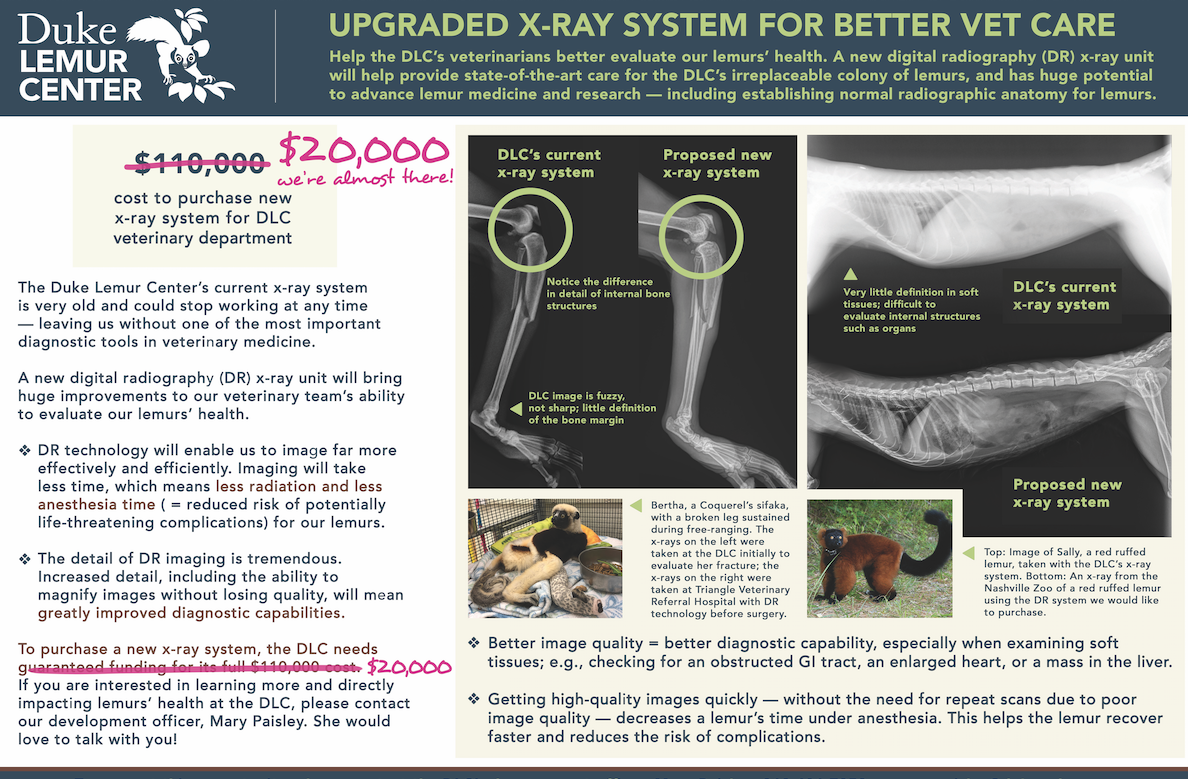UPDATE: Thank you!
Thank you for making #GivingTuesday a record-breaking success! On December 1, we shared with you an urgent need to replace and upgrade an essential piece of veterinary equipment: our X-ray system. Our existing X-ray machine was rapidly nearing the end of its long lifetime of service to the DLC’s lemurs and could stop working at any time, making the purchase of a new X-ray system an urgent priority that just couldn’t wait.
To purchase a new unit, however, the DLC needed guaranteed funding for the system’s full $110,000 cost. Although we’d been able to set aside $90,000, the urgent need to acquire an X-ray system one year sooner than anticipated left us $20,000 short of its purchase. And that’s where you came in.
When we set the goal of $20,000 for our #GivingTuesday campaign, it truly was out of need. We knew it was a seriously ambitious goal, but it was vital for us to try. And on Wednesday morning, you showed us that even the loftiest of dreams can come true: At just after 7:40 a.m. EST, we surpassed $20,000 in #GivingTuesday gifts.
We’re humbled and astounded by this level of generosity and, as promised, every single dollar will go toward the purchase of the new digital X-ray system. Our veterinary team is celebrating, and lemurs will reap the benefits of the new system for years and years to come.
From the bottom of our hearts, THANK YOU for your support. We couldn’t have done this without you!
Help us #CloseTheGap
In Nov. 2018, hundreds of donors and social media followers contributed $10,000 in 14 hours (!) to purchase an ICU kennel for the DLC’s lemurs. We were, and still are, humbled and astounded by this level of generosity. Thanks to your support, the new ICU has vastly improved the care of numerous lemurs—including our beloved aye-aye, Ozma. From the bottom of our hearts, thank you!
This #GivingTuesday, we’re again sharing with you an urgent need to replace and upgrade an essential piece of veterinary equipment: our X-ray system. Our existing X-ray machine is rapidly nearing the end of its long lifetime of service to the DLC’s lemurs. Unfortunately, it’s beyond repair and could stop working at any time, leaving us without one of the most important diagnostic tools in lemur veterinary medicine—making this purchase an urgent priority that just can’t wait.
To purchase a new unit, the DLC needs guaranteed funding for the system’s full $110,000 cost. Although we’ve been able to set aside $90,000, the urgent need to acquire an X-ray system one year sooner than anticipated leaves us $20,000 short of its purchase. Will you help us reach our goal of $20,000 to fund this need?
Together, we can #CloseTheGap and purchase a new digital radiography unit to provide state-of-the-art care for our irreplaceable colony of lemurs. Your gift of $5, $10, or more would make a big difference to us!
How will the new X-ray system help lemurs?
AT THE DLC: Here in Durham, a new digital radiography (DR) X-ray unit will vastly improve our veterinary team’s ability to evaluate our lemurs’ health.
DR technology will enable us to image far more effectively and efficiently. Getting high-quality images quickly—without the need for repeat scans due to poor image quality—will take less time, which means less radiation and less time under anesthesia. This helps the lemur to recover faster, and reduces risk of potentially life-threatening complications.
High-quality images are crucial for sending to specialists for second opinions, without the need to transport an injured or ill lemur to a specialty hospital for additional imaging and repeat radiation.
The detail of DR imaging is tremendous. Increased detail, including the ability to magnify images without losing quality, means greatly improved diagnostic capabilities—especially when examining soft tissues; e.g., checking for an obstructed GI tract, an enlarged heart, or a mass in the liver.
AROUND THE WORLD: The new X-ray system has enormous potential to advance lemur medicine around the globe. Safe, high-quality X-rays taken during lemurs’ routine exams at the DLC will be used to establish normal radiographic anatomy for each species we house—a new resource valuable not just to the Lemur Center, but to every institution that cares for lemurs.
“Suppose, during an exam, you have an animal that presents with a heart murmur,” says DLC veterinarian Laura Ellsaesser, D.V.M. “In dogs, the first thing a vet would do is take x-rays to see if the heart was normal-sized or enlarged. If the heart was enlarged, the vet would begin to worry about heart failure.
“That diagnosis is possible because, for dogs and cats, there are established measurements that say, ‘This is what a normal heart looks like. This is how big it should be in comparison to an individual’s vertebrae.’ But in lemurs, we don’t have those measurements. What’s ‘normal’ hasn’t been established.”
By using DR imaging to record measurements for a wide range of species and individuals, the DLC’s veterinarians can establish normal radiographic anatomy for lemurs. The ability to identify the differences between normal vs. abnormal anatomy will assist our vets, and lemur veterinarians around the world, in making more accurate diagnoses—ultimately leading to more successful treatment outcomes.
All of this adds up to an improved quality of care for our lemurs, and better health long-term.
Above: Young lemurs love to play! All that playtime sometimes leads to minor injuries. Luckily, by using state-of-the-art diagnostic equipment like digital X-rays, our veterinarians can quickly diagnose and treat any injuries—letting youngsters like Shezmu get back to their favorite activity: snacks!
Thank you!
All gifts through the links above to our unrestricted donations page between now and the end of the day on #GivingTuesday (December 1, 2020) will go toward this very special purchase at the Duke Lemur Center! All donations are tax-deductible.
Thank you so much for your support! If you have any questions, please contact our development officer, Mary Paisley, at (919) 401-7252 or mary.paisley@duke.edu. She would love to hear from you!



